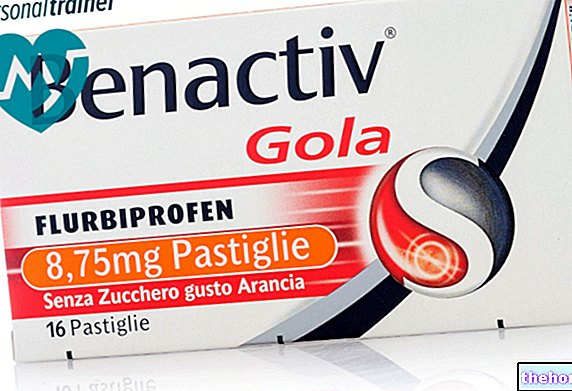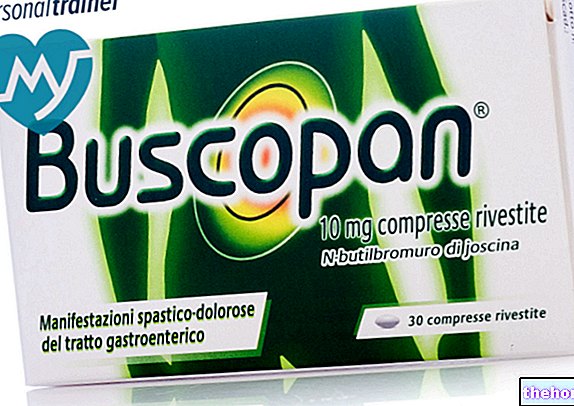Active ingredients: N-acetylcysteine tuaminoheptane sulfate
Rinofluimucil 1% + 0.5% nasal spray solution
Why is Rinofluimucil used? What is it for?
What is that
Rinofluimucil is a nasal fluidifier and decongestant.
Why is it used
Rinofluimucil is used for: acute and subacute rhinitis, with mucopurulent and slow-resolving exudates. Chronic and mucus-crusted rhinitis. Vasomotor rhinitis. Sinusitis.
Contraindications When Rinofluimucil should not be used
When it should not be used
- Hypersensitivity to the active substance or to any of the excipients.
- Narrow angle glaucoma.
- Hyperthyroidism.
- During and in the two weeks following therapy with antidepressant drugs (selective monoamine oxidase inhibitors).
- Children under the age of 12.
- Pheochromocytoma.
- While using other sympathomimetic agents, including other nasal decongestants.
- Hypophysectomy or surgery with exposure of the dura mater.
Precautions for use What you need to know before you take Rinofluimucil
When it can be used only after consulting your doctor
In children over 12 years of age, the product should be used only in case of real need and under medical supervision.
In patients with cardiovascular diseases, especially those with hypertension, the use of nasal decongestants must be subjected to the judgment of the physician from time to time.
In patients suffering from occlusive vascular disease, asthma, diabetes and in therapy with beta-blocking drugs, the drug should be used only after consulting the doctor. It is advisable to consult the doctor even in cases where these disorders have occurred in the past.
Precautions for use
In the elderly and in patients with prostatic hypertrophy the product should be used with caution due to the danger of urinary retention. The action of the preparation can be integrated, in the opinion of the doctor, with an appropriate antibacterial cover.
Interactions Which drugs or foods can modify the effect of Rinofluimucil
What medicines or foods can change the effect of the medicine
Tell your doctor or pharmacist if you have recently taken any other medicines, even those without a prescription.
Despite the poor systemic absorption of intranasally administered tuaminoheptane, the following potential interactions should be considered:
- monoamine oxidase inhibitors (MAOIs), including reversible monoamine oxidase inhibitors (RIMA): increased risk of hypertensive crisis;
- antihypertensives (including adrenergic neuron blockers and beta blockers): can block hypotensive effects;
- cardiac glycosides: can increase the risk of dysrhythmia;
- ergot alkaloids: may increase the risk of ergotism;
- antiparkinsonian drugs: can increase the risk of cardiovascular toxicity;
- oxytocin: may increase the risk of hypertension.
Warnings It is important to know that:
What to do during pregnancy and breastfeeding
Pregnancy
Data from a limited number of pregnant women exposed to N-acetylcysteine did not indicate any adverse effects on the pregnancy itself or on the health of the fetus / newborn. At present, no further relevant epidemiological data are available. Animal studies have shown no direct or indirect harmful effects with respect to reproductive toxicity. There are no data on pregnant women exposed to youraminoheptane or animal studies with youraminoheptane. Rinofluimucil is not recommended in pregnancy.
Feeding time
There is no information available on the excretion of N-acetylcysteine and tuaminoheptane in breast milk therefore the product should not be used by breastfeeding mothers.
It is important to know that:
Prolonged use of preparations containing vasoconstrictors can alter the normal function of the mucous membrane of the nose and paranasal sinuses, also inducing addiction to the drug. Repeating applications for long periods can be harmful.
The preparation is not for ophthalmic use.
Attention for those who carry out sporting activities: the product contains substances prohibited for doping. It is "forbidden" to take other than those reported in terms of dosage schedule and route of administration.
For those who carry out sporting activities, the use of medicines containing ethyl alcohol can determine positive doping tests in relation to the alcohol concentration limits indicated by some sports federations.
The medicine contains the preservative benzalkonium chloride which can cause skin reactions or bronchospasm.
Effects on ability to drive and use machines
There are no assumptions or "evidence that the drug can change attentional skills and reaction times.
Dosage and method of use How to use Rinofluimucil: Dosage
How to use this medicine
How many
Attention, do not exceed the indicated doses without the advice of the doctor. Adults: 2 sprays in each nostril 3-4 times a day.
Children over 12 years: 1 pump in each nostril 3-4 times a day.
Rinofluimucil must be sprayed into the nasal cavity using the special dispenser.
When and for how long
Warning: use only for short periods of treatment, and in any case not more than one week. Consult your doctor if the disorder occurs repeatedly or if you have noticed any recent changes in its characteristics.
Like:
Open the bottle by squeezing the sides of the capsule and unscrewing at the same time.
- Screw on the nebulizer pump, after having freed the float from the protection. 2
- Remove the cap from the dispenser.
- Operate the pump several times to activate it.
Overdose What to do if you have taken too much Rinofluimucil
In case of accidental ingestion / intake of an excessive dose of Rinofluimucil, notify your doctor immediately or go to the nearest hospital.
In case of overdose, arterial hypertension, photophobia, intense headache, chest tightness and hypothermia with marked sedation may appear, requiring the adoption of adequate emergency measures.
IF YOU HAVE ANY DOUBTS ABOUT THE USE OF RINOFLUIMUCIL, CONTACT YOUR DOCTOR OR PHARMACIST.
Side Effects What are the side effects of Rinofluimucil
Like all medicines, Rinofluimucil can cause side effects, although not everybody gets them.
The product can locally determine phenomena of sensitization and congestion of the rebound mucous membranes.
Frequent administration of the preparation at higher doses can cause sympathomimetic side effects (such as increased excitability, heartbeat, tremor, etc.). Sometimes dryness of the nose and throat and acneic eruptions can occur. These effects disappear with the suspension of the drug. treatment.
The following side effects may be associated with the use of Rinofluimucil; the frequency of these side effects is not known (cannot be estimated from the available data):
Compliance with the information contained in the package leaflet reduces the risk of undesirable effects. These side effects are usually transient. However, when they occur, it is advisable to consult your doctor or pharmacist.
If any of the side effects gets serious, or if you notice any side effects not listed in this leaflet, please inform your doctor or pharmacist.
Request and fill in the undesirable effects report form available at the pharmacy (form B).
Expiry and Retention
Expiry: see the expiry date indicated on the package.
Warning: do not use the medicine after the expiry date indicated on the package.
The expiry date indicated refers to the product in intact packaging, correctly stored. The opened bottle can be used for a period not exceeding 20 days.
KEEP THE MEDICINAL PRODUCT OUT OF THE REACH AND SIGHT OF CHILDREN.
It is important to always have the information on the medicine available, so keep both the box and the package leaflet.
Medicines should not be disposed of via wastewater or household waste. Ask your pharmacist how to throw away medicines you no longer use. This will help protect the environment.
Composition and pharmaceutical form
Composition
1 ml of solution contains: Active ingredients: N-acetylcysteine 10 mg, Tuaminoheptane sulfate 5 mg. Excipients: benzalkonium chloride, dithiothreitol, sodium edetate, dibasic sodium phosphate, monobasic sodium phosphate, sodium hydroxide, alcohol, hypromellose, sorbitol, natural flavor of mint, purified water.
How it looks
Rinofluimucil comes in the form of a solution with a nebulizer. The contents of the package are 10 or 25 ml.
Source Package Leaflet: AIFA (Italian Medicines Agency). Content published in January 2016. The information present may not be up-to-date.
To have access to the most up-to-date version, it is advisable to access the AIFA (Italian Medicines Agency) website. Disclaimer and useful information.
01.0 NAME OF THE MEDICINAL PRODUCT
RINOFLUIMUCIL 1% + 0.5% NASAL SPRAY SOLUTION
02.0 QUALITATIVE AND QUANTITATIVE COMPOSITION
100 ml of solution contain:
Active principles
N-Acetylcysteine 1,000 g
Tuaminoheptane sulfate 0.500 g
For the full list of excipients, see section 6.1
03.0 PHARMACEUTICAL FORM
Nasal spray, solution.
04.0 CLINICAL INFORMATION
04.1 Therapeutic indications
- Acute and subacute rhinitis, especially with mucopurulent and slow-resolving exudates.
- Chronic and mucus-crusted rhinitis.
- Vasomotor rhinitis.
- Sinusitis.
04.2 Posology and method of administration
RINOFLUIMUCIL is used for applications in the nasal cavity, using the appropriate dosage dispenser (see section 6.6).
ADULTS: 2 sprays in each nostril 3-4 times a day.
CHILDREN over 12 years: 1 pump in each nostril 3-4 times a day.
Do not exceed the indicated doses.
The bottle, when opened, can be used for a period not exceeding 20 days.
04.3 Contraindications
Hypersensitivity to the active substance or to any of the excipients.
Narrow angle glaucoma.
Hyperthyroidism.
During and in the two weeks following therapy with monoamine oxidase inhibitors (MAOIs).
Children under the age of 12.
Pheochromocytoma.
While using other sympathomimetic agents, including other nasal decongestants.
Hypophysectomy or surgery with exposure of the dura mater.
04.4 Special warnings and appropriate precautions for use
In patients with cardiovascular diseases, and especially in hypertensive patients, the use of nasal decongestants must be subjected to the judgment of the physician from time to time.
Administer with caution in subjects suffering from occlusive vascular disease, asthma, diabetes and in therapy with beta-blocking drugs. Rinofluimucil should be administered with caution in pediatric age and is in any case contraindicated in children under the age of 12 years.
The prolonged use of preparations containing vasoconstrictors can alter the normal function of the mucous membrane of the nose and paranasal sinuses, also inducing addiction to the drug. Repeating applications for long periods can therefore be harmful.
Use the product with caution, due to the risk of urinary retention, in the elderly and in patients with prostatic hypertrophy.
The use, especially if prolonged, of topical products can give rise to sensitization phenomena: in this case it is necessary to interrupt the treatment and, if necessary, to institute a suitable therapy. However, in the absence of a complete therapeutic response within a few days, consult your doctor; in any case, treatment should not be continued for more than a week.
The action of the preparation can be integrated, in the opinion of the doctor, with an appropriate antibacterial cover.
Tuaminoheptane sulfate can determine a positive doping test. The preparation is not for ophthalmic use.
Important information about some of the ingredients
The preservative benzalkonium chloride can cause skin reactions or bronchospasm.
04.5 Interactions with other medicinal products and other forms of interaction
Despite the poor systemic absorption of tuaminoheptane administered intranasally, the following potential interactions should be considered:
- monoamine oxidase inhibitors (MAOIs), including reversible monoamine oxidase inhibitors (RIMA): increased risk of hypertensive crisis;
- antihypertensive agents (including adrenergic neuron blockers and beta blockers): they can block the hypotensive effects;
-cardiac glycosides: can increase the risk of dysrhythmia;
- ergot alkaloids: may increase the risk of ergotism;
- antiparkinsonian drugs: they can increase the risk of cardiovascular toxicity;
oxytocin: may increase the risk of hypertension.
04.6 Pregnancy and lactation
Pregnancy
Data from a limited number of pregnant women exposed to N-acetylcysteine did not indicate any adverse effects on the pregnancy itself or on the health of the fetus / newborn. At present, no further relevant epidemiological data are available. Animal studies have shown no direct or indirect harmful effects with respect to reproductive toxicity.
There are no data on pregnant women exposed to youraminoheptane or animal studies with youramonoheptane.
Rinofluimucil is not recommended in pregnancy.
Feeding time
There is no information available on the excretion of N-acetylcysteine and tuaminoheptane in breast milk therefore the product should not be used by breastfeeding mothers.
04.7 Effects on ability to drive and use machines
There are no assumptions or evidence that the drug can change attentional skills and reaction times.
04.8 Undesirable effects
Frequent administration of the preparation at higher doses can cause sympathomimetic side effects (such as increased excitability, heartbeat, tremor, etc.). Sometimes dryness of the nose and throat, acne rashes can occur. These effects disappear completely with the suspension of treatment.
The following side effects may be associated with the use of Rinofluimucil; the frequency of these side effects is not known (cannot be estimated from the available data):
04.9 Overdose
In case of overdose, arterial hypertension, photophobia, severe headache,
chest tightness and hypothermia with marked sedation in children, which require the adoption of adequate emergency measures.
05.0 PHARMACOLOGICAL PROPERTIES
05.1 Pharmacodynamic properties
Pharmacotherapeutic group: Rhinological preparations - decongestants-sympathomimetics in combination ATC: R01AB08
The mucolytic and vasoconstrictive activity of the specialty are the expression of the pharmacological characteristics of the individual components.
L"N-Acetylcysteine it is endowed with mucolytic activity which is realized by the breaking of the disulfide bridges of the mucoproteins by the free sulfhydryl, allowing to obtain a fluidifying action on the nasopharyngeal secretions.
The tuaminoheptane sulfate, is a "sympathomimetic amine which for topical use exerts a" vessel constricting action without evident systemic effects.
05.2 "Pharmacokinetic properties
The individual components of the specialty are not absorbed systemically at active doses.
05.3 Preclinical safety data
Studies, conducted to highlight possible local and / or systemic toxic effects, have demonstrated the good tolerability of the specialty on mucous and serous surfaces.
06.0 PHARMACEUTICAL INFORMATION
06.1 Excipients
Benzalkonium chloride, Dithiothreitol, Sodium edetate, Dibasic sodium phosphate, Monobasic sodium phosphate, Sodium hydroxide, Alcohol, Hypromellose, Sorbitol 70%, Natural mint flavor, Purified water.
06.2 Incompatibility
None as far as is known.
06.3 Period of validity
30 months (thirty)
The expiry date indicated refers to the product in intact and correctly stored packaging.
The bottle, when opened, can be used for a period not exceeding 20 days.
06.4 Special precautions for storage
No particular.
06.5 Nature of the immediate packaging and contents of the package
Yellow glass bottle containing 10 ml or 25 ml of solution, closed with an aluminum cap with gasket + safety cap.
Carton containing one bottle, one screw mist blower and package leaflet.
Bottle of 10 ml
Bottle of 25 ml
06.6 Instructions for use and handling
INSTRUCTIONS FOR OPENING THE BOTTLE AND USING THE DISPENSER:
Open the bottle by squeezing the sides of the capsule and unscrewing at the same time.
Screw on the nebulizer pump, after having freed the float from the protection.
Remove the cap from the dispenser.
Operate the pump several times to activate it.
07.0 MARKETING AUTHORIZATION HOLDER
ZAMBON ITALIA s.r.l.
Via Lillo del Duca, 10 - 20091 Bresso (MI)
08.0 MARKETING AUTHORIZATION NUMBER
10 ml bottle - AIC n ° 021993050
Bottle of 25 ml - AIC n ° 021993062
09.0 DATE OF FIRST AUTHORIZATION OR RENEWAL OF THE AUTHORIZATION
First authorization: 1 March 1971
Renewal: 1 June 2010
10.0 DATE OF REVISION OF THE TEXT
October 14, 2011




























